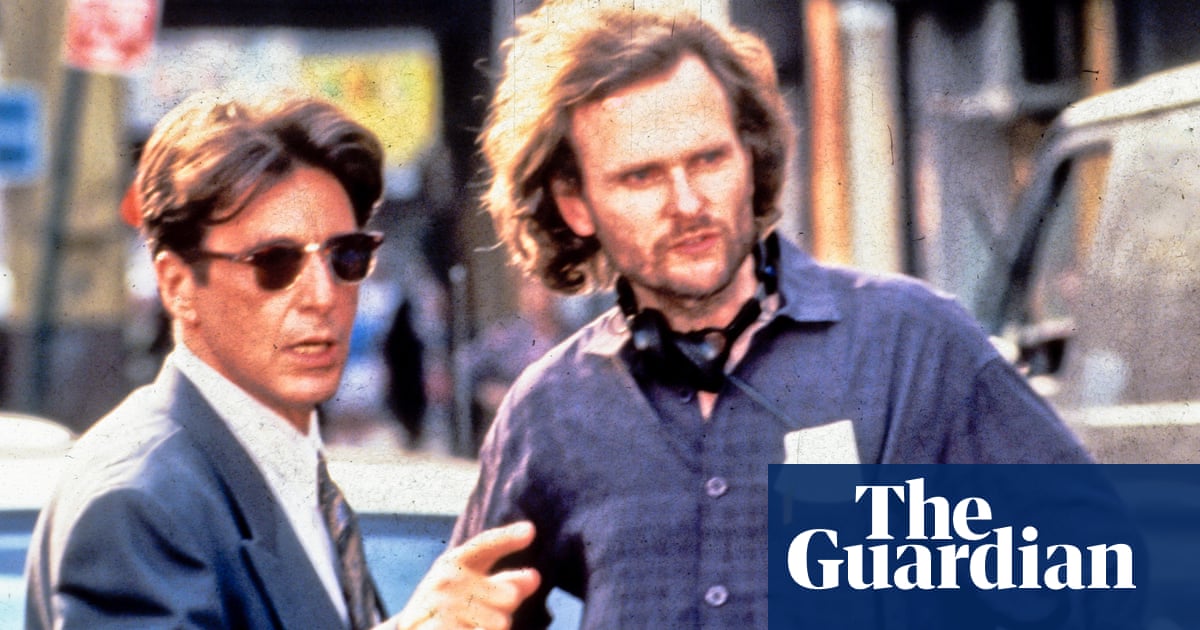The film director James Foley, who has died from brain cancer aged 71, was a self-effacing and shrewd stylist whose camerawork always served the actors and the psychology of the characters. This thespian focus was best showcased in his 1992 adaptation of David Mamet’s stage playGlengarry Glen Ross; its heavyweight cast, which included Al Pacino,Jack Lemmon, Alec Baldwin, Ed Harris and Kevin Spacey, might have overwhelmed a less purposeful supervisor.
But in his hands this dissection of American capitalism, set in a beleaguered real-estate office, became an actors’ masterclass; the cast would turn up on their days off to watch each other work. Foley had been convinced to direct it by a new version of Mamet’s script that broke down what on stage had been cerebral monologues into pithy, visceral repartee. Accordingly, the director insisted on casting “great actors, people with movie charisma, to give it watchability, especially since the locations were so restricted”.
Recruiting Pacino as Ricky Roma, the star salesman, Foley had the luxury of a three-week rehearsal period. He used it to avoid a pitfall endemic to Mamet: “There was a real danger that actors could get seduced by the superficial level of gratification that comes with saying great dialogue. I was much more interested in getting actors that had an interior, emotional life,”he told the WHYY radio station in Philadelphia.
With many of the stars reducing their salaries to come on board, egos were on hold – a prerequisite for Foley. “My litmus test is I have to be able to make fun of actors, and of who they are, and their fame,” he said.
It paid dividends: the finished Glengarry Glen Ross had a commanding intensity and bite. The“always be closing” pep talk– an added scene with Baldwin in the role of head office’s ball-breaking envoy – later became a staple of acting classes. The film’s prising open of male belligerence and insecurity was a recurrent feature in Foley’s films, which were often noir-inflected, character-focused crime dramas. Its milieu of tawdry salesmanship, and the eternal imperative of the hustle, must surely have resonated with his struggle to rise up Hollywood’s pecking order.
Born in Bay Bridge, Brooklyn,New York, James was the son of Frances and James Sr, a lawyer, and grew up in Staten Island. After graduating in psychology from the State University of New York at Buffalo in 1974, he abruptly switched tack to cinema after taking a six-week course at New York University. He then studied for a master’s degree at the University of Southern California’s School of Cinematic Arts in 1979.
Foley was offered the chance to direct by Hal Ashby, an errant New Hollywood auteur; Ashby was impressed by one of the young man’s films being projected on to a wall at a student party. They never made anything together, but what Foley described as Hollywood’s “weird calculus” meant Ashby’s patronage was enough to earn him the directorial chair on his first feature: a derivative but energetic high-school romance, Reckless (1984).
He followed it up with the crime drama At Close Range (1986), starring his friendSean Pennas a Pennsylvanian latchkey teenager drawn into the orbit of his psychopathic father, played by Christopher Walken. Not only exhibiting Foley’s way with actors, especially in Walken’s flamboyant but subtly shaded performance, the director also imbued the film with an insistent romanticism. He later summed up his low-key approach to style as: “I like getting the movie inside of the drama as if there was no director involved.”
Foley’s connection to Penn led to him directing the screwball comedyWho’s That Girl(1987), starring the actor’s then wife, Madonna (he was best man at the couple’s wedding, and directed the music videos for Madonna’s Live to Tell,Papa Don’t Preachand True Blue, under the name Peter Percher). Who’s That Girl was a critical and commercial bomb; Foley had to regroup in the wake of this atypical foray into lighter material: “It was a major life experience. Thatfirst failure is so shocking,” he told Film Freak Central.
He returned with the fraught and intense desert noir After Dark, My Sweet (1990), adapted from the 1955 Jim Thompson novel, which was Foley’s only feature-writing credit. Although, like many of his films, it was a commercial failure despite critical admiration, it earned him Pacino’s attention for Glengarry Glen Ross.
Foley continued working throughout the 90s and early 2000s, with his two films with Mark Wahlberg – the teen sociopath thriller Fear (1996) and the actioner The Corruptor (1999) – finding moderate commercial success. But the critical lashing and commercial failure of the costly $60m cyberstalking neo-noirPerfect Stranger(2007), starring Halle Berry and Bruce Willis, led to him being consigned to “director jail” for a time.
For much of the 2010s, he worked exclusively in TV, a medium about which he expressed reservations; among other jobs, David Fincher – whose psychological slant he shared – hired him to direct 12 episodes of the Netflix seriesHouse of Cards.
For his final features he accepted a franchise gig: directing the two sequels to Fifty Shades of Grey, in 2017 and 2018. Easily the most commercially successful films of his career, he viewed them with a certain pragmatism. “The movie is not going to win Oscars,” he said ofFifty Shades Darker. “But I don’t think it’s going to win Razzies [Golden Raspberry awards]. That’s my goal – to not win a Razzie.”
Having weathered several cycles of fortune within Hollywood, this journeyman took the long view: “I’m interested in studying the history of directors, and why they make a few good films and then fall off the map. You look to the credits of episodic TV and there they are – and I think that it has so much to do with how you respond to failure.”
He is survived by a brother, Kevin, and two sisters, Eileen and Jo Ann.
James Foley, film director, born 28 December 1953; died 6 May 2025
